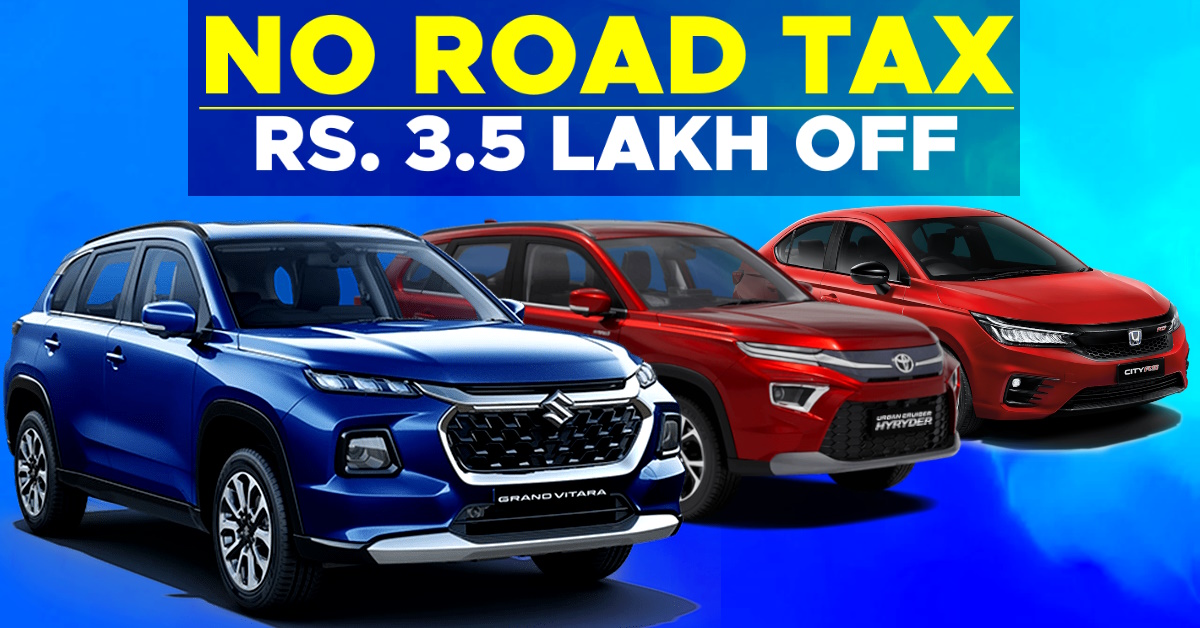Rs. 3.5 Lakh Price Cut On Hybrids in Karnataka: Maruti Grand Vitara, Toyota Hyryder, Honda City May Get 3.5 Lakh Cheaper


Karnataka seems to have taken a leaf out of Uttar Pradesh’s hybrid car playbook. A Reuters report states that Karnataka is looking to make hybrid cars a lot cheaper by reducing the road tax it charges on cars that cost under 30,000 US dollars or about Rs. 25 lakh. The policy is yet to be notified though, and there’s no clarity on when Karnataka will announce the new policy aimed at encouraging the adoption of fuel efficient and low emission hybrid cars.
Strong hybrid cars such as the Maruti Suzuki Grand Vitara, Toyota HyRyder and Honda City eHEV will qualify for the road tax cut as they’re all priced well under US$ 30,000, or around Rs. 25 lakh. However, costlier strong hybrid cars such as the Toyota Innova HyCross, Maruti Invicto, Toyota Camry, Lexus LM 350h and even the Toyota Alphard will not qualify for the road tax cut in Karnataka as they’re priced well above 30,000 US dollars, or Rs. 25 lakh.
If Karnataka follows the UP model, and waives off road tax on the three cars listed above, they’re likely to get cheaper by about Rs. 3.5-4 lakh depending on the variant chosen. This would make these cars a lot more attractive than electric cars that are priced at similar levels as hybrids are quite efficient but don’t have the limitations of 1. battery range, and 2.. charging infrastructure challenges.
If Karnataka does go ahead and waive off road tax, either partly or fully, this could have a cascading effect, and other states could follow. In fact, Karnataka was one of the first states in India to come up with an electric vehicle (EV) policy where it reduced road tax to bare minimum, and kept the policy in play for years until EV adoption in the state multiplied rapidly. So, a similar approach towards strong hybrid cars could make such cars very popular among buyers, encouraging automakers to build more hybrids over electric cars.
For a while now, Maruti Suzuki and Toyota – two of India’s leading hybrid car makers – have been lobbying union and state governments to tax strong hybrid cars at much lower rates, and at par with electric cars. For the union government to cut tax on strong hybrid cars, the GST council (comprising of the center and states) has to come to an agreement, which is something that may take time.
On the other hand, state governments can’t cut GST as that power lies with the union governments. What the state governments can instead do is, they can choose to waive off road tax. In fact, many state governments have waived off road tax on electric cars, making them much cheaper. In fact, Uttar Pradesh – India’s largest state by population – has already waived off road tax on hybrid cars including even costlier ones such the Toyota Innova HyCross, Camry and Maruti Invicto. A similar strategy is likely to be adopted by Karnataka.
While Union Transport Minister has openly batted for reduction of GST charged on hybrid cars to make them more attractive to buyers, Finance Minister Nirmala Sitharaman has showed no signs of taking this forward. Former Niti Aayog chairman and currently the Sherpa of G20, Amitabh Kant, who has been a strong votary of electrification, has also disagreed with Mr. Gadkari, stating that any cut on tax on hybrid cars would adversely affect India’s car electrification plans.
Automakers seem split right in the middle when it comes to cutting tax on strong hybrid cars. Tata Motors, Mahindra, Mercedes Benz Hyundai and Kia want hybrid cars to be taxed at a much higher rate than electric cars. On the other hand, India’s largest automaker Maruti Suzuki, and its alliance partner Toyota, has been arguing for a cut in tax charged on strong hybrid cars. Other automakers such as Skoda, Volkswagen, Citroen, Nissan and Renault seem to be watching from the sidelines, not taking sides just as yet.
From Mercedes Benz to Ford, Hyundai to Volvo, most car makers who were gung-ho about going electric are now scaling down electrification plans rapidly. Swedish automaker Volvo, who famously said that its entire car portfolio will be all-electric by 2030, has now backtracked, and is considering hybrids in a big way. Ford has also scaled back on plans to go electric as sales have tanked. Like Volvo, Ford is also considering hybrids in a big way.
Toyota, an automaker whose chairman Akio Toyoda famously called complete electrification of cars ‘madness’, will be having the last laugh. Toyota has been very cautious about electrifying its range of cars, instead choosing to focus on hybrids in a big way. Toyota’s strategy could pay off as most global car makers, save for the Chinese, are now looking at hybrids over electric cars.
A slew of hybrid cars are coming soon to India. Market leader Maruti Suzuki plans to introduce series hybrid technology next year in the Fronx Compact Crossover. This technology is also expected in the Toyota Taisor, and a range of other Maruti Suzuki cars including the Swift, Dzire and Baleno for starters.
Hyundai is readying up a Mahindra XUV700 rival, which will be powered by a petrol strong hybrid powertrain. In fact, JSW-MG Motor – an Indo-Chinese automaker – has also announced that it would start selling hybrid cars in India next year through the MG Select chain of premium car dealerships. Skoda chairman Klaus Zellmer recently noted that the Czech car brand is ready to bring hybrid cars to India should the market demand.
Summing it up, hybrids seem to be taking the fight right up to electric cars, and it’ll be very interesting to see how the automotive landscape shapes up in the next half a decade.